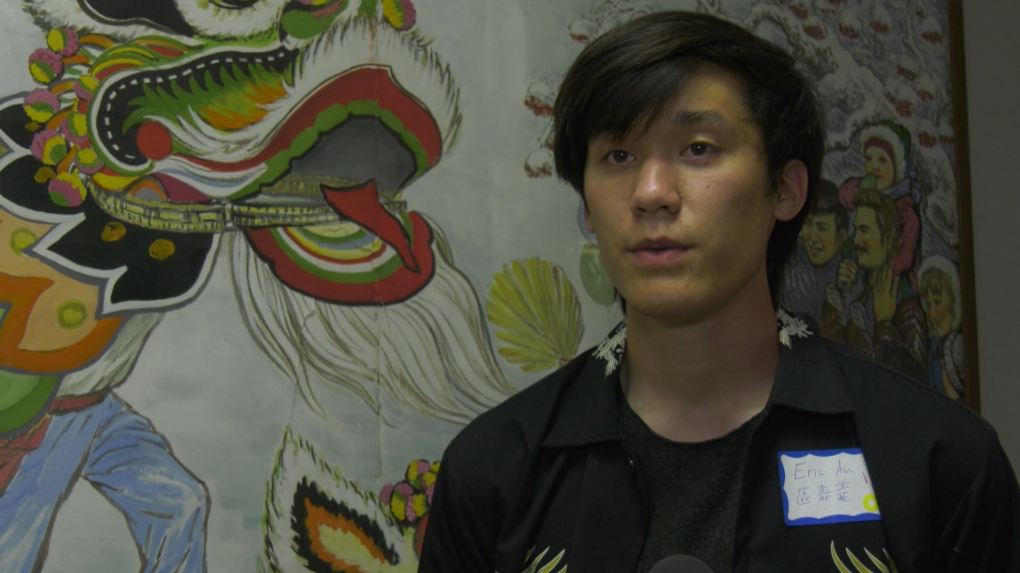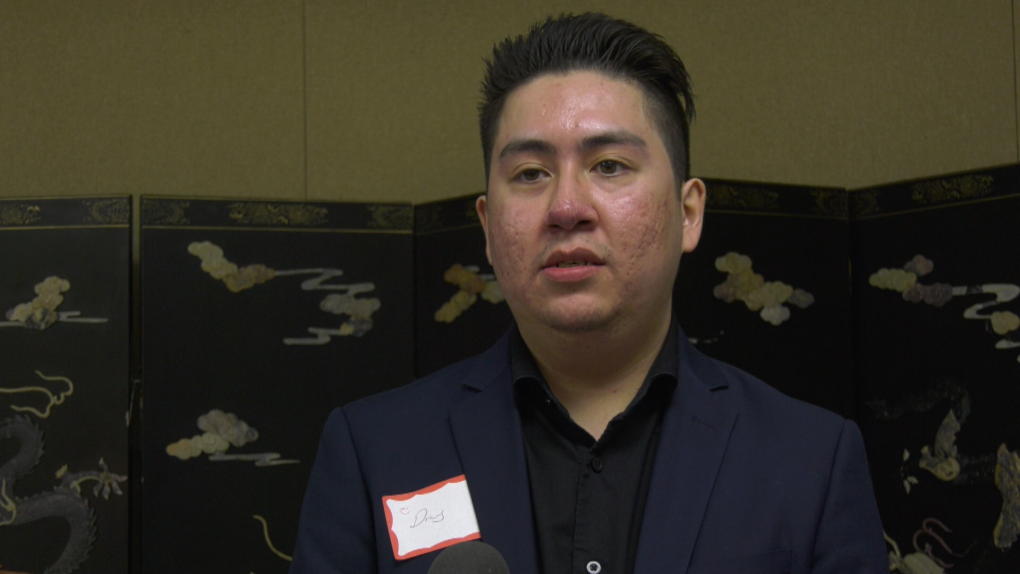From intergenerational trauma to resilience: Edmonton Chinese and Indigenous youth conference builds understanding
Two groups of youth gathered in Edmonton's Chinatown this weekend to help exchange ideas and share their cultures to build greater solidarity.
For the first time in-person, youth from the Enoch Cree Nation and the local Chinese community hosted a series of panels, discussions, and forums, all centred on anti-racism and resiliency.
"We wanted to come together to build understanding between our communities and really get to know each other and building that relationship between the youth and the elders," said Eric Au, Chinese Benevolent Association of Edmonton Youth Council chair.
On Saturday, both groups participated in cultural demonstrations with a powwow, drumming circle, martial arts, and Indigenous and Chinese dances.
The focus turned to anti-racism on Sunday, with discussions demonstrating how racism and intergenerational trauma have impacted Indigenous and Chinese communities in different and parallel ways. The event culminates on Monday with a youth action planning project to help both communities concretely move forward together.
"As we grow up and go through the school system, we get an introduction to Indigenous history and the issues that non-white people face, but really, the need to learn is not very satisfied," Au added.
 Eric Au, Chinese Benevolent Association of Edmonton Youth Council chair, said the pair of youth groups hope to host more events like the cultural conference in the future (CTV News Edmonton/Jessica Robb).
Eric Au, Chinese Benevolent Association of Edmonton Youth Council chair, said the pair of youth groups hope to host more events like the cultural conference in the future (CTV News Edmonton/Jessica Robb).
Dreydon Thomas, Enoch Youth Advisory Council member, explained how the Indigenous reserve system and historical attitudes and policies surrounding Chinatowns across Canada share similarities.
"Chinatowns come out of segregation in Canada, and as new Chinese immigrants used to come here they were put in areas where white people did not want to be," Au said.
"Indigenous peoples, in general, we've been placed on reservations, but also Chinese people have placed, segregated or even pushed to building in Chinatown places. That's where our groups feel comfortable and feel more like a community for ourselves.
"It's important to recognize that these spaces that come out of racist policies and disadvantages to non-white communities also create a place where we can come together and celebrate our cultures."
The youth councils hope that having these "hard-hitting" and difficult conversations will pave the way forward for a better future.
"It can get scary at times," Thomas said. "Building these relationships kind of help us in being able to tackle even bigger decisions, questions, and bigger difficulties."
"It shows the level of maturity and level of support not only to us but to different levels of government that we are able to have these conversations."
 Dreydon Thomas, Enoch Youth Advisory Council member, said while discussing anti-racism can be difficult at times, finding out about shared experiences builds trust and resiliency (CTV News Edmonton/Jessica Robb).
Dreydon Thomas, Enoch Youth Advisory Council member, said while discussing anti-racism can be difficult at times, finding out about shared experiences builds trust and resiliency (CTV News Edmonton/Jessica Robb).
HOPE FOR THE FUTURE
Sixty-five people registered to attend the weekend conference, with proceedings open to respective community members and all Edmontonians.
"If we want long-lasting solutions and we want to connect with those people, it has to be together," Au said.
For Amanda Morin, Enoch Cree Nation councillor, this weekend's conference represents the start of something greater.
"Speaking as an Indigenous woman, we were taught from our history in residential schools and colonialism to not speak," she told CTV News Edmonton. "That spaces weren't safe.
"It's super important as an Indigenous woman, as a mom, as a grandma, as a daughter, a sister, a friend, to be able to create these spaces so that our youth can start breaking those cycles of intergenerational trauma and we now call it intergenerational resiliency, so we can overcome."
As she listened to the youth and elders tackle different issues and approaches to anti-racism, Morin said she was encouraged to see the youth gain more courage to speak and engage.
"It makes me really happy," Morin said. "If you create the space, a safe space, those difficult conversations are no longer difficult and you can find a lot of love and support there.
"As each of our generations come along, they're realizing how similar we all are as humans.
"Realizing that we are not alone in a lot of things we've gone through. Regardless of our race, we're all human and being able to connect and share gives us all hope."
With files from CTV News Edmonton's Jessica Robb
CTVNews.ca Top Stories

B.C. tenants evicted for landlord's use after refusing large rent increase to take over neighbouring suite
Ashley Dickey and her mother rented part of the same Coquitlam duplex in three different decades under three different landlords.
Mountain guide dies after falling into a crevasse in Banff National Park
A man who fell into a crevasse while leading a backcountry ski group deep in the Canadian Rockies has died.
Expert warns of food consumption habits amid rising prices
A new survey by Dalhousie University's Agri-Food Analytics Lab asked Canadians about their food consumption habits amid rising prices.
MPP Sarah Jama asked to leave Ontario legislature for wearing keffiyeh
MPP Sarah Jama was asked to leave the Legislative Assembly of Ontario by House Speaker Ted Arnott on Thursday for wearing a keffiyeh, a garment which has been banned at Queen’s Park.
Charlie Woods, son of Tiger, shoots 81 in U.S. Open qualifier
Charlie Woods failed to advance in a U.S. Open local qualifying event Thursday, shooting a 9-over 81 at Legacy Golf & Tennis Club.
Ex-tabloid publisher testifies he scooped up possibly damaging tales to shield his old friend Trump
As Donald Trump was running for president in 2016, his old friend at the National Enquirer was scooping up potentially damaging stories about the candidate and paying out tens of thousands of dollars to keep them from the public eye.
Here's why provinces aren't following Saskatchewan's lead on the carbon tax home heating fight
After Prime Minister Justin Trudeau said the federal government would still send Canada Carbon Rebate cheques to Saskatchewan residents, despite Saskatchewan Premier Scott Moe's decision to stop collecting the carbon tax on natural gas or home heating, questions were raised about whether other provinces would follow suit. CTV News reached out across the country and here's what we found out.
Montreal actress calls Weinstein ruling 'discouraging' but not surprising
A Montreal actress, who has previously detailed incidents she had with disgraced Hollywood producer Harvey Weinstein, says a New York Court of Appeals decision overturning his 2020 rape conviction is 'discouraging' but not surprising.
Caleb Williams, Jayden Daniels and Drake Maye make it four NFL drafts with quarterbacks going 1-3
Caleb Williams is heading to the Windy City, aiming to become the franchise quarterback Chicago has sought for decades.

































